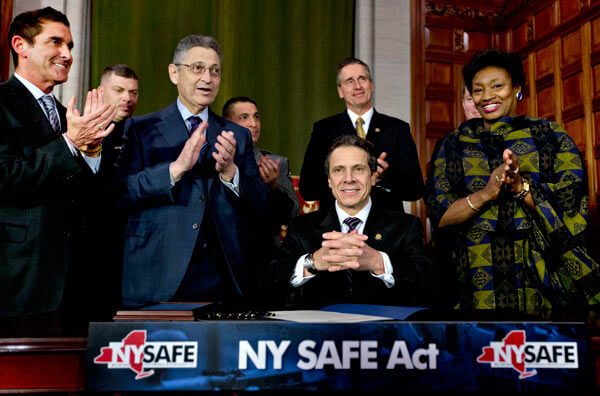By Rich Bockmann
Queens lawmakers who worked to pass the state’s speedily approved gun reforms this week cautiously praised the legislation, saying it still needed to be tested and there was more work to do to prevent further violence.
Albany moved quickly this week to enact the New York Secure Firearms and Ammunition Enforcement Act of 2013, the first and toughest firearms reform passed following the killings at Sandy Hook Elementary School in Newtown, Conn., in December.
Gov. Andrew Cuomo had laid his plan to have New York lead the nation on the issue during his State of the State address last week, and the state Legislature moved swiftly to pass it through both houses.
On Monday, the first day back in session, the Senate worked late into the night to approve the act by a vote of 43-18, and the next day the Assembly followed suit, voting 104-43. Cuomo signed the bill into law shortly after 5 p.m. Tuesday.
The following day, President Barack Obama introduced his gun control proposals which takes on similar reforms as the New York law, such as banning assault weapons and limit high-capacity magazines and requiring private sellers to conduct background checks.
Mayor Michael Bloomberg called the president’s proposals “common sense” gun control.
In Queens, state Sen. Malcolm Smith (D-St. Albans), who helped draft the Senate’s bill, said the law’s tougher sentences for gun charges will have a direct impact in the borough.
“This sends a direct message to people in Queens, in particular, who run around with illegal guns in the community,” he said.
Among some of its reforms, the act expands the state’s ban on assault weapons and ammunition clips, requires gun owners to register their weapons and brings the rest of the state in line with the city’s license-renewal requirements.
“It will certainly deter certain types of mass shootings,” state Sen. Michael Gianaris (D-Astoria) said. “No one’s going to stop a lunatic who’s trying to damage and hurt people, but this makes it more difficult for a person to go out there and kill or injure someone.”
Gianaris added there was still a lot of work to do expand care for the mentally ill.
“There’s a lot of discussion about it and a lot of recognition of need,” he said.
In some instances, the reforms address criminals, such as increased penalties for illegal-possession charges. Others, though, such as a requirement that certain gun owners safely secure their firearms, create new regulations for law-abiding gun owners.
The National Rifle Association took issue with how hastily the state moved to pass the act and criticized its effectiveness.
“These gun control schemes have failed in the past and will have no impact on public safety and crime. Sadly, the New York Legislature gave no consideration to that reality,” the group said in a statement. “While lawmakers could have taken a step toward strengthening mental health reporting and focusing on criminals, they opted for trampling the rights of law-abiding gun owners in New York, and they did it under a veil of secrecy in the dark of night.”
The act creates a state database of mental health records that are currently sent into a federal database, but mental health professionals are not held liable for refusing to submit such information.
The act also requires suspension of licenses for those to be deemed mentally ill and says such a person’s firearm “will then be removed,” but Sen. Tony Avella (D-Bayside) said it was not clear just exactly how that would happen.
“I still think there are details that need to come out of the framework,” he said. “It gets into not only a constitutional but a human rights issue, and there’s going to be an ongoing discussion about how parts of the law are implemented and do we need to go further.”
Reach reporter Rich Bockmann by e-mail at rbockmann@cnglocal.com or by phone at 718-260-4574.




































